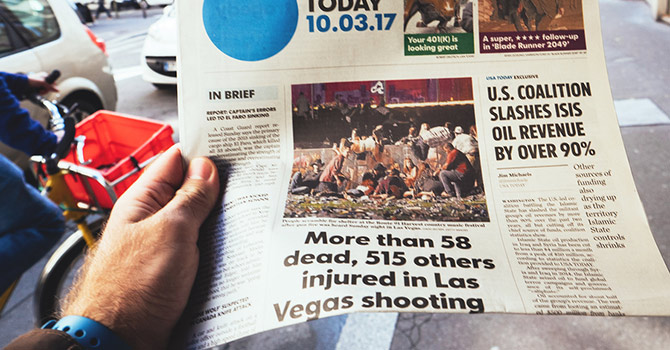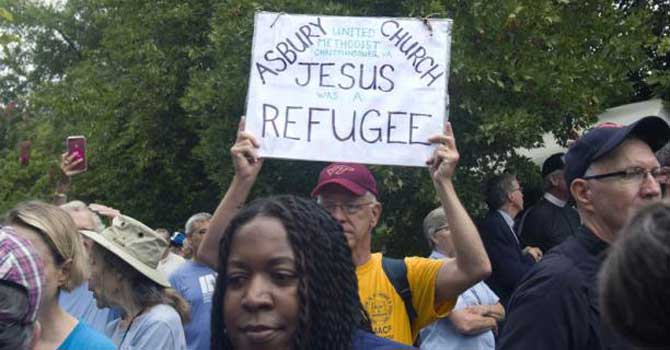Matthew 22:34-46 (NRSV)
Editor’s note: Faith & Leadership offers sermons that shed light on issues of Christian leadership. This sermon was preached on October 23, 2011, at Trinity Presbyterian Church in Atlanta, Ga.
Our text begins and ends in silence. Jesus has already silenced the Sadducees. So the Pharisees gather to question him. But by the end of the exchange between Jesus and the Pharisees, again there is silence. No one can answer Jesus’ query. Nor from that day on does anyone dare to ask him any more questions.
Silence. And this silence is not golden. It’s an eerie silence. It’s the silence of the “powers that be” as they regroup and retrench. It’s the silence of wagons being circled and theologies turning into solid iron. It’s that silence that arrives when the time for words is over and something else must be done. This silence is deadly. The next time we see the religious leaders, they will be plotting to kill Jesus.
Silence is the consequence of Jesus’ speech. Here we have the final episode of an extended exchange between Jesus and the religious authorities. First the disciples of the Pharisees and the Herodians question Jesus. Then the Sadducees. Then the Pharisees themselves.
Back and forth, back and forth, they verbally duel over critical matters of theology and biblical interpretation. And the exchanges take place in the temple, with a large crowd watching the entire time.
There is tension. There is pressure. The religious authorities repeatedly try to trap Jesus with their trick questions. But every time, he slips the trap. He refuses to be caught by their either-or options, their rigid theological categories. At every turn, Jesus’ answers unsettle the ordered and controlled world of the authorities. Jesus disrupts their interpretations of Scripture, and he rearranges their theological certainties.
And finally, at the culmination of the exchange, Jesus offers a little riddle of his own:
“What do you think of the Messiah? Whose son is he?” Jesus asks.
And the Pharisees answer, “The son of David.”
I suspect the Pharisees probably mumbled their answer, almost whispered it. For the crowds had been calling Jesus the Son of David. Remember Jesus’ entry into Jerusalem.
“Hosanna to the Son of David!” the crowds had shouted. “Blessed is the one who comes in the name of the Lord!” (Matthew 21:9).
The Pharisees are on dangerous ground here. But no other answer is possible. The suspense builds.
And Jesus doesn’t leave well enough alone. Instead, he continues, quoting the Pharisees’ own Scripture -- Psalm 110.
“How is it then that David by the Spirit calls [the Messiah] Lord, saying,
‘The Lord said to my Lord,
“Sit at my right hand,
until I put your enemies under your feet”’?
If David thus calls [the Messiah] Lord, how can he be [David’s] son?”
With his little riddle, Jesus interrupts the Pharisees’ nice, neat theology. The old categories simply don’t work here. A person cannot be both son and Lord to David. Something new is here, something that can’t be contained in the old frameworks. The riddle cannot be solved -- except by recognizing and following Jesus.
And that response is impossible for the religious authorities. It would rearrange their entire world. It would mean a loss of control and authority. So they don’t answer. And they don’t dare to ask any more questions. Instead, they are silent. And they circle their wagons and harden their theology. They plot to kill Jesus.
Jesus here is a kind of jester, riddling truth to those in power. He does exactly what jesters do. As Enid Welsford wrote in her classic book, “The Fool,” jesters “melt the solidity of the world.” They melt the conventions and rationalities and categories that are supposedly written in stone. And they invite a new perception of the world and a new way of living in the world.
Jesus the jester also melts the solidity of the world. He rearranges the world. He calls for new discernment, new perception and new life.
And not surprisingly, he uses a riddle -- because that’s what riddles also do. Riddles melt the solidity of the world. They play with our sense of order and our values. Riddles are difficult to answer, sometimes seemingly impossible. Because they topple the very hierarchy of ideas and assumptions that normally allows us to make sense of the world. So Jesus plays the riddler. [See Tom Thatcher, “Jesus the Riddler.”]
Archbishop Desmond Tutu, in South Africa, also played the riddler during the days of apartheid. He once told this joke:
A drunk, so the story goes, crossed the street to accost a perplexed pedestrian and asked, “I shay, which is the other shide of the street?” Nonplussed, the pedestrian replied, “That side of course!” “Shtrange,” said the drunk, “when I wash [on] that shide, they shaid it was thish shide.”
Here’s the riddle in the joke: When is this side the other side? And with this innocent little riddle, Tutu melts the solidity of the world. He interrupts the rigid definitions of sides that so shaped South Africa during apartheid. And he scrambles all of our deep assumptions about “sides,” whether in South Africa or here in the United States.
There’s no solving Tutu’s riddle, When is this side the other side? Rather, we have to live into a new and different world. A world without rigid “sides.” A world in which the circled wagons and iron theologies that divide us begin to melt.
It’s the same with Jesus’ riddle. How can the Messiah be David’s son if David calls him Lord? Son-Lord -- who can be both at the same time? There’s no solving the riddle with the old categories and the familiar ways of thinking. Rather, we have to enter a new world where those old categories are melting away and a new, unsettling life beckons.
I’m beginning to think the gospel itself has this unsettling character. The gospel itself is a kind of jester. All the way through the gospel we find paradoxes and riddles and parables that melt the solidity of the old age that is dying and call us into an unsettling new creation that is being born.
Crucified Messiah. Impossible!
Good Samaritan. Outrageous!
Blessed poor. What?
Love enemies. No way!
Footwashing Lord. Never!
Weak power.
Foolish wisdom.
Last first.
First last.
Paradoxical riddles -- all of them. They can’t be solved as if they were a nice, neat mathematical problem. Rather, they create a new reality, which we live into by following Jesus.
In Jesus Christ the new creation has interrupted the old age. And the old cannot contain the new, any more than our old categories can contain or solve Jesus’ riddles. As several New Testament scholars have noted, Jesus’ interruption of the old age creates a kind of threshold space, like the threshold space between two rooms. This space is unsettled; it’s an in-between space. A threshold is neither fully one room nor the other, but it contains an interplay of each. On the threshold one is moving, always moving in between. The threshold is neither stable nor secure. It is the opposite of circled wagons and iron theologies.
That’s the kind of space Jesus creates when he interrupts the old age with the new creation. He creates a threshold space in between the old that is dying and the new that is being born. And he calls us not to solve the riddle by trying to plug it into the old categories. Rather, he simply calls us to live into that unsettling threshold space. It’s odd, really. Jesus doesn’t call us to stability or security or certainty. Rather, Jesus calls us to follow him, always on the move, always on the way from the old to the new.
And maybe today we are in a position to appreciate this unsettling, in-between gospel. For we belong to a church that is in transition, that is in between -- between the old ways that are dying and the new that is being born, even though we cannot fully discern its form yet.
And we live in a nation that is in transition. We sense that something is happening: something old is dying, and the future will be different from the past.
And the world itself seems to be in transition -- political, cultural, environmental -- moving toward something new and at times frightening. In such a context, the great temptation is to circle the wagons, to secure ourselves, to sharpen the sides.
And we hear these reactions everywhere we turn. Sometimes we hear them in the silence that pulls the trigger of a gun or drops a bigger bomb. Sometimes we hear them in the discordant sounds of bitter shouting.
As followers of Jesus, however, we need not respond to these unsettling times with circled wagons and iron theologies. For we are in-between people, threshold people. We are not bound to the old categories, the old hierarchies, the old conventions. We are people always living into the gospel’s new, unsettling riddles. We are people who follow Jesus, unafraid, on the way from the old that is dying to the new that is being born.
So again and again we come to this feast of fools -- this jester’s table. This table melts the solidity of the world just like the gospel it enacts. For this table continues the disruptive table manners of Jesus -- table manners that unsettled everything as much as his parables and his riddles.
Meals in Jesus’ culture intentionally reinforced the old hierarchies and categories: insiders and outsiders, honored and shamed, clean and unclean, us and them. Meals circled the wagons, defined the sides. But as he ate and drank, Jesus interrupted those old-age practices and invited everyone to feast in the new creation that is being born. So Jesus ate with all the wrong people: those who were unclean, the outsiders, the tax collectors and sinners. At the Last Supper he even served the one who would betray him and those who would desert him.
At Jesus’ table, everyone is welcome. It is one big feast of fools. It is impossible! It is outrageous!
As outrageous as a vision a homeless man once shared with me. Several years ago, the week after Labor Day, I was waiting for a MARTA train in downtown Atlanta. A homeless man I knew waved at me from across the platform, and he came to join me. He told me about his search for a job, where he had been staying, how he was doing.
At one point I asked him where he had eaten on Labor Day -- a difficult day for homeless people, because many services are closed. He told me he had eaten at 910, a homeless ministry that typically feeds around 300 people that day. As we got on the train and sat down, the man’s eyes got big as he described the meal: “Pinto beans,” he said. “And cornbread this thick,” he announced, as he held his thumb and forefinger about two inches apart.
“How many people ate that day?” I asked him.
He paused for a moment, then looked at me and said in a very loud voice, “Thousands! There were thousands! They came from the north and the south and the east and the west. There were thousands!”
Soup kitchen -- messianic banquet.
There’s a riddle for us.
Imagine that.
Live into that.







